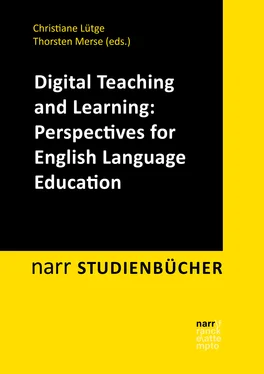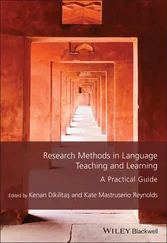speaking about current social developments in Anglophone contexts necessitates an exploration of how such developments unfold in social media and hashtags;
becoming a fluent communicator today means to be fluent in digital and multimodal communication channels;
developing into a reader today requires the capacity to read (and view) digital posts, newsfeeds, YouTube videos, digital games, or interactive fiction.
transforming schools(4) The fourth implication addresses the need to develop strategies for digital education in the school institution as a whole. Indeed, the DigCompEdu framework stresses the need to
diversify the use of digital technologies and resources available at a school while putting them to meaningful use in classrooms,
share experience of digital teaching, and exchange good examples of digital resources, within the professional communities of teachers,
constantly reflect, critique and renew digital teaching and learning practices of the institution, especially where educators become innovating Pioneers (at the C2 level).
Ideally, such innovation and progress are not achieved by one teacher alone, but as a collaborative effort shared and developed by many. Depending on the digital challenge in question, some teachers might require guidance that other teachers can offer, and vice versa. Such supportive dialogue and exchange of expertise can also unfold across subjects and subject teachers. This way, the development of digital competence in educators and within schools can become embedded in a conscious give-and-take professional culture of mutual support.
Summary
Fostering digital competence is a central task of the ongoing professional development of EFL teachers, beginning with pre-service teachers at the university stage up to in-service teachers who are immediately involved in school contexts and classrooms. To achieve this task, the European DigCompEdu framework provides indispensable orientation and hands-on points of entry. Its value lies in connecting a teacher’s (and jointly, a whole institution’s) increasing digital competence with an energetic pedagogic core that puts learners at the center, including the digital innovation of new forms of learner empowerment, learning-teaching scenarios, assessment, and ultimately, crucial avenues into developing digital competences in learners. To achieve this, self-reflection and self-assessment can help teachers identify the strengths and weaknesses of their existing digital competences in light of available progression stages.
Follow-up and Reflection: Tasks and Questions
To get a realistic impression of your current pedagogic professionalism in the field of digital competences, you can use the competence descriptors and questionnaire items provided in this article for your own or for peer-reflection. For a hands-on result, you can also use the DigCompEdu “Check-In Self-Reflection Tool” to locate yourself within the steps of the progression model and retrieve impulses for your development (available via https://ec.europa.eu/eusurvey/runner/DigCompEdu-S-EN).
Identify areas and sub-dimensions of your digital competence that you wish to improve. Actively seek out learning opportunities to achieve your goals, e.g. in internships at schools or in the second phase of your teacher training ( Referendariat ). Constantly reflect on your own progress.
Develop a lesson sequence on a topic of your own choice. Integrate digital resources and digital ways of teaching and learning into your sequence. Think and reflect: When is the integration of digital aspects meaningful, and what purposes do they serve? Which parts of the lesson sequence would work equally well without the digital, and why?
Commented Suggestions for Further Reading
Redecker, Christine (2017). European Framework for the Digital Competence of Educators: DigCompEdu . Punie, Yves (ed.). EUR 28775 EN. Publications Office of the European Union, Luxembourg. (publications.jrc.ec.europa.eu/repository/bitstream/JRC107466/pdf_digcomedu_a4_final.pdf , last access 26 June).
We recommend reading the full-length version of the European Framework for the Digital Competence of Educators . For each sub-dimension and progression level of digital competences, you can find helpful descriptions and guidance for practice. The glossary of terms is additionally helpful.
Caspari, Daniela; Klippel, Friederike; Legutke, Michael K. & Schramm, Karen (eds.) (2016). Forschungsmethoden in der Fremdsprachendidaktik. Ein Handbuch. Tübingen: Narr.
This edited volume provides a thorough introduction into empirical research within foreign language didactics. It explains research concepts and approaches to data analysis in accessible ways and is therefore a good reference for student-driven research, e.g. for a master’s thesis.
Конец ознакомительного фрагмента.
Текст предоставлен ООО «ЛитРес».
Прочитайте эту книгу целиком, купив полную легальную версию на ЛитРес.
Безопасно оплатить книгу можно банковской картой Visa, MasterCard, Maestro, со счета мобильного телефона, с платежного терминала, в салоне МТС или Связной, через PayPal, WebMoney, Яндекс.Деньги, QIWI Кошелек, бонусными картами или другим удобным Вам способом.












